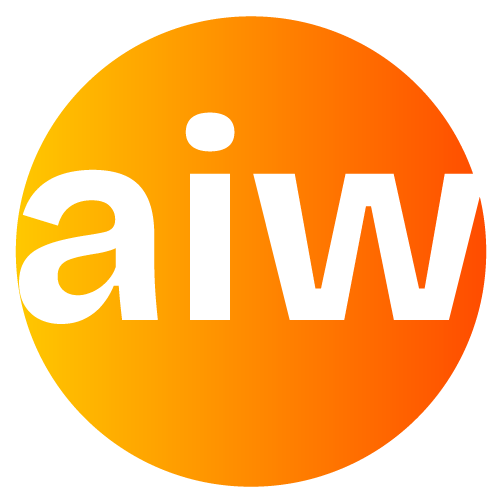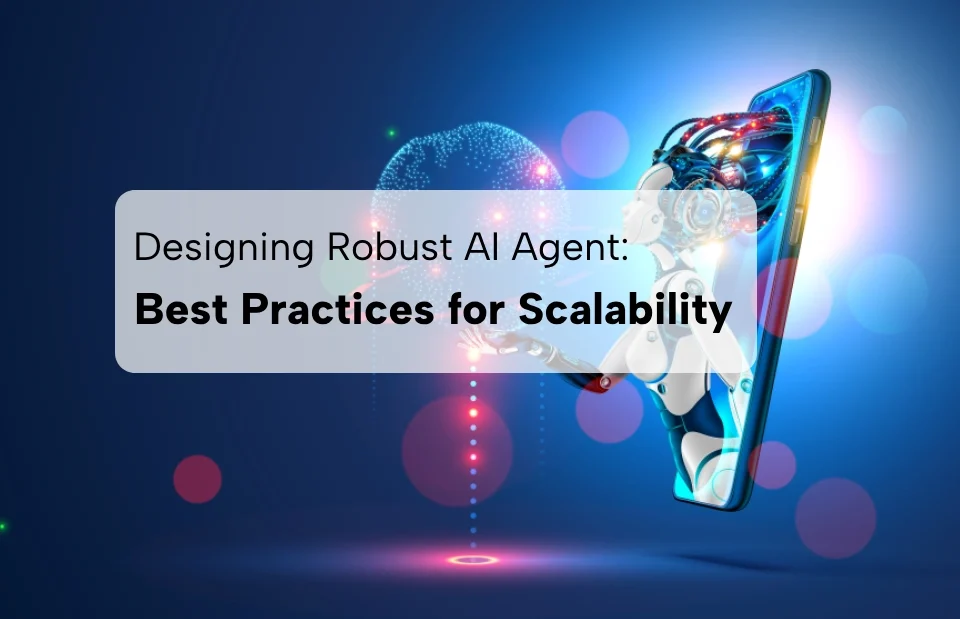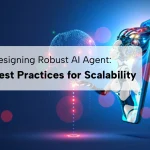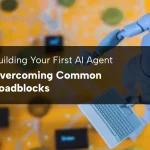AI is evolving—and the next frontier is here. Agentic AI marks a major leap beyond traditional chatbots and scripted automation. These intelligent systems don’t just respond; they plan, decide, and act autonomously. For enterprises, this shift is game-changing. Agentic AI has the power to transform complex workflows, reduce operational bottlenecks, and boost productivity at scale.
The momentum is building fast. Analysts predict that by 2027, up to 50% of GenAI users will pilot agentic AI solutions. As organizations seek smarter, more adaptive systems, agentic AI is emerging as the next wave in intelligent automation—redefining how businesses operate and compete.
Key Takeaways:
- Agentic AI (agentic artificial intelligence) refers to autonomous AI agents that plan and act.
- Unlike chatbots, agents decide and act, executing tasks without constant human prompts.
- Used in finance, healthcare, retail, and more, agentic systems drive efficiency and agility.
- Agentic AI systems differ from rule-based bots: they are goal-driven and adaptive.
- Enterprises should vet agentic AI companies and vendors carefully for integration and support.
Table Of Contents
What Is Agentic AI?
Agentic AI (agentic artificial intelligence) refers to autonomous AI agents that operate independently to achieve high-level goals. It builds on generative AI by adding the ability to plan and act. For example, an agent can identify the best time to visit a city, then book travel and accommodation autonomously. It turns prompts into outcomes by forming a plan, using tools, and learning from results.
Unlike chatbots or RPA bots, agentic AI systems are dynamic. Each agent understands context, breaks down goals, and adapts its workflow. In business, agentic AI companies are building digital workers that can independently run operations. These AI systems rely on reasoning engines like large language models and external tools like APIs or CRMs.
According to IBM, agentic AI enables real-time task execution across departments. Whether it’s updating support policies or launching a campaign, AI agents handle the complexity without direct intervention.
How Does Agentic AI Work?
Agentic AI combines language models, logic, and tools to operate autonomously. When a user gives a goal, the AI agent interprets it, forms a plan, and breaks it into actionable steps. It then gathers relevant data—via databases, APIs, or user inputs—and uses this to execute tasks. Unlike traditional automation, agentic AI adapts as it works, adjusting to new information or unexpected changes.
The core loop is: prompt → plan → act → learn. First, the user provides a high-level instruction. The agent clarifies the intent if needed, then creates a workflow. It pulls in data using tools like web search, scheduling APIs, or external models (e.g., for vision or analytics). Actions are carried out through system integrations.
Over time, the agent refines its strategy using feedback. This loop enables it to self-correct, improving both accuracy and efficiency. In practice:
- Step 1: User gives goal. Agent asks clarifying questions if needed.
- Step 2: Agent breaks goal into a plan with multiple steps.
- Step 3: Agent gathers data from databases, sensors, or the web.
- Step 4: The agent uses AI models (LLMs) and tools to perform each step.
- Step 5: Agent executes tasks via APIs and monitors results.
- Step 6: Agent learns from outcomes and adjusts its strategy for next time.
This autonomy lets agentic systems manage complex workflows with minimal oversight. They adapt, learn, and act—making them ideal for dynamic business environments.
Real world Use cases of Agentic AI across Industries
Agentic AI is already delivering value across sectors by automating complex, multi-step processes. Here’s how different industries are applying it:
-
Finance
- Automates credit card processing, payment date changes, and compliance checks.
- Handles entire customer workflows—from request to follow-up campaigns.
- Supports fraud detection, loan approvals, and risk analysis.
Example: An agent processes a loan by verifying documents, checking policies, and issuing decisions—without human input.
-
Healthcare
- Streamlines patient care with appointment scheduling, triage, and claims handling.
- Monitors symptoms, schedules tests, and notifies medical staff autonomously.
- Analyzes records, recommends treatments, and tracks outcomes.
-
Retail & e-commerce
- Powers “agentic commerce” (e.g., Amazon’s “Buy for Me”).
- Agents find products, fill forms, and place orders across sites.
- Optimizes supply chains by monitoring stock and reordering as needed.
- Runs personalized marketing by launching real-time micro-campaigns
-
Customer Service
- Manages complex support tickets, not just responses.
- Follows up, escalates, and updates cases automatically.
- Uses knowledge bases to resolve queries and flag dissatisfaction.
-
Cybersecurity
- Bridges the talent gap in threat detection and response.
- Monitors systems, flags anomalies, and patches vulnerabilities autonomously.
- Tackles the global shortage of 4M+ cybersecurity professionals (World Economic Forum).
-
Manufacturing & Logistics
- Oversees production, predicts maintenance, and manages supply chains.
- Coordinates agents to reroute shipments and balance inventory in real time.
Across industries, the pattern is clear: agentic AI frees humans from repetitive work and boosts efficiency. Companies like Adobe and Aramark report up to 80% auto-resolution of tasks using AI agents. The future isn’t far off—it’s already happening.
Agentic AI Systems vs Traditional Automation
Agentic AI systems are goal-driven and adaptive, unlike traditional automation tools like RPA bots that follow rigid, pre-defined rules. When conditions change, traditional bots often fail. Agentic AI, however, reasons through problems and adjusts in real time.
For example, a chatbot may show flight options, but an agentic system can book the entire trip—flights, hotel, and forms, autonomously. It makes decisions and takes action, not just responds. This flexibility allows agentic AI to handle complex workflows, while traditional automation struggles beyond routine, predictable tasks. One reacts—agentic AI decides.
| Aspect | Traditional Automation | Agentic AI Systems |
| Workflow style | Fixed rules, linear | Goal-driven, adaptive |
| Independence | Low | High (autonomous) |
| Handling exceptions | Rigid, manual override | Learns and adapts |
| Decision making | Pre-programmed | Autonomous reasoning |
| Outcome | Task completion | Goal achievement |
| Example | Scheduled report | Multi-step processes |
| Efficiency | Improves specific tasks | Transforms end-to-end |
In short, agentic AI is not just an upgrade to RPA or a smarter chatbot. It’s a whole new category of AI automation: one that can plan, negotiate, and act on its own. This “next step in intelligent automation” allows systems to operate with minimal oversight.
Benefits of Agentic AI for Enterprises
Agentic AI offers transformative value for modern enterprises. By automating complex, multi-step workflows, it drives efficiency, scalability, and innovation.
-
Productivity at Scale
Unlike task-based bots, agentic AI automates entire processes. A study shows GenAI boosts worker productivity by up to 40%—agentic systems amplify that by handling full workflows end-to-end.
-
Real-Time Adaptability
These systems adapt instantly to changing conditions. Agents can adjust marketing campaigns mid-flight or re-prioritize tasks when business needs shift.
-
Personalization & Customer Experience
Agents use company data to personalize interactions. In customer support, they recall previous queries. In sales, they identify leads and even schedule meetings—boosting satisfaction and conversion.
-
Cost Efficiency
By reducing manual effort, agentic AI lowers operational costs. One firm using conversational agents cut ticket response time in half.
-
Innovation & New Revenue Streams
Agentic AI enables entirely new services—whether client-facing products or internal tools previously too complex to automate. As InterVision highlights, this opens the door to new monetization models.
-
Security & Compliance
With 24/7 monitoring, agents catch issues early. Combined with human oversight, they help enterprises stay compliant while improving accuracy.
In short, agentic AI helps businesses move faster, serve smarter, and innovate continuously—unlocking next-level agility and growth.
Roadmap to Implement Agentic AI in Your Enterprise
Implementing enterprise agentic platform, requires a phased approach to maximize ROI and ensure alignment with business goals.
Phase 1: Identify High-Impact Use Cases
Start by mapping workflows that are repetitive, multi-step, and data-driven.
Example: Automating loan application review or IT ticket triage.
Phase 2: Vendor Evaluation & Tool Selection
Choose a vendor offering an enterprise agentic platform with proven scalability, integrations, and security.
Example: A retail firm selects a platform that connects with its CRM and inventory systems.
Phase 3: Pilot Launch
Deploy agents in a controlled environment on a low-risk process. Monitor performance closely.
Example: An insurance firm uses agents to process simple claims and learn from results.
Phase 4: Governance & Human Oversight
Define escalation rules, feedback loops, and human-in-the-loop checkpoints.
Example: A customer support agent flags unresolved issues to human reps after 3 failed attempts.
Phase 5: Full-Scale Rollout
Expand agents to other departments. Build internal playbooks, training, and change management plans.
Example: A financial services firm scales from KYC to portfolio rebalancing with agent supervision.
Agentic AI success depends on strategic rollout, measurable KPIs, and adaptive feedback cycles. Start small, scale smart.
Choosing the Right Agentic AI Vendor
Selecting the right agentic AI vendor is crucial for long-term success. Enterprises should evaluate platforms on several key factors:
- Scalability: Ensure the solution can handle enterprise-scale operations. Ask for benchmarks showing performance under peak load.
- Integration Capabilities: Look for well-documented APIs and pre built connectors. The agentic AI solution should plug into your CRM, data systems, and tools without disrupting workflows.
- Security & Governance: Confirm how data is handled. The vendor must offer encryption, access controls, and compliance with regulations.
- Cost & ROI: Assess the total cost of ownership, including licensing and setup. Balance this with projected savings from automation, faster decision-making, and fewer manual tasks.
- Domain Expertise: Prefer vendors with experience in your industry. They’ll better understand your compliance, workflows, and goals.
- Customer References: Speak to current clients. Ask how the platform performs in real-world deployments and whether promised results were delivered.
- Ongoing Support: Look for solid SLAs, onboarding help, and a responsive support team. Training and future roadmap visibility are also vital.
Ultimately, you’re not just buying a tool—you’re choosing a transformation partner. Test small, track impact, and scale based on clear value. A thoughtful selection process ensures success.
FAQs
What is Agentic AI?
Agentic AI refers to autonomous systems capable of making decisions and executing tasks without human intervention. Unlike basic chatbots, agentic AI doesn’t just respond—it acts. For instance, rather than suggesting how to fix an issue, it solves it end-to-end. These systems adapt to dynamic inputs and operate independently, making them a major advancement in enterprise automation.
How does Agentic AI work?
It starts with a user request. The agent interprets the goal, breaks it into steps, and builds a plan. Using large language models (LLMs) for reasoning, it collects data, invokes APIs, and takes action. Agents track outcomes and adjust future behavior, creating a feedback loop. For example, an agent booking travel could search flights, reserve hotels, and send confirmations without human help.
How is it different from traditional automation?
Traditional automation (e.g., RPA) follows scripts. Generative AI generates text or images but doesn’t act. Agentic AI, however, is goal-driven and dynamic—it plans and executes. It can re-route mid-task if conditions change. That makes it far more flexible and impactful in complex business environments.
What are the common use cases?
In finance, agents manage loan approvals, compliance, and client onboarding. In healthcare, they handle triage and follow-ups. In retail, they power shopping tools that complete purchases. Other industries use them for cybersecurity, logistics, and customer support—wherever workflows can be automated.
Will agentic AI replace human jobs?
Not entirely. Today’s agents augment human workers by handling repetitive tasks. Employees are freed to focus on strategy, creativity, and decision-making. Most deployments use “assistive agents” that still involve human oversight.
Are enterprise agentic platforms secure?
Yes—when built right. Mature platforms include encryption, access controls, audit logs, and human-in-the-loop features. Enterprises should define governance policies to ensure agents operate within legal and ethical bounds.
What’s next for agentic AI?
Agentic AI will become more collaborative, intelligent, and widely adopted. We’ll see systems with stronger memory, context, and physical-world integration. Regulation will also play a key role as these systems scale into mainstream use.
Conclusion
Agentic AI is redefining automation for modern enterprises. Unlike traditional rule-based systems, agentic AI empowers intelligent agents to plan, act, and adapt in real time—without human intervention. From automating loan approvals in finance to managing personalized support journeys in customer service, it enables businesses to scale operations, reduce manual effort, and deliver faster outcomes.
But adopting agentic AI isn’t just about new tech—it’s about rethinking how work gets done. Success requires a clear understanding of your workflows, high-impact use cases, and a partner that can deliver secure, scalable implementation.
That’s where AI Workfllow comes in. We specialize in helping enterprises design and deploy custom AI agents, with full consulting and infrastructure support. Whether you’re exploring your first use case or building an enterprise agentic AI platform, we provide the expertise, integration, and governance needed to succeed.
Agentic AI is no longer a futuristic idea—it’s a strategic advantage available now. The question is not if you’ll adopt it, but how soon you’ll start.
Ready to lead the next wave of intelligent automation?
Get in touch with AI Workfllow and let’s build the future together.

Dhruv Dholakia has spent over a decade helping enterprises streamline operations through workflow automation and digital transformation. With a strong belief in building purposeful tech, he now focuses on the next frontier—custom AI solutions and Agentic AI. For Dhruv, AI isn’t just a buzzword; it’s a tool to solve real-world problems and create lasting impact. He’s passionate about making AI accessible, responsible, and truly useful for people, teams, and businesses navigating today’s fast-changing world.





